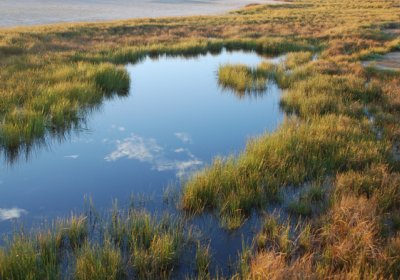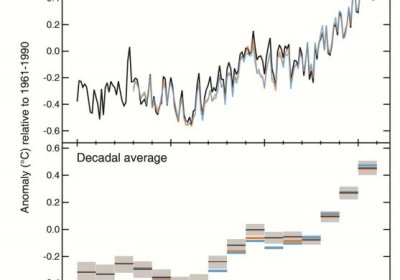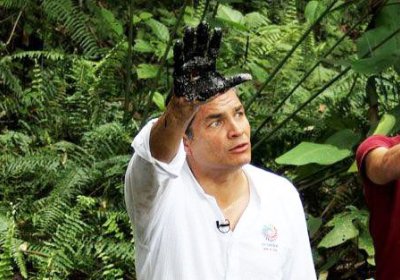In April, Calgary-based pipeline company TransCanada ― the same company behind the proposed Keystone XL tar sands pipeline ― formally proposed and launched an open season for a monumental new project: the Energy East tar sands pipeline, a C$12 billion, 4400 kilometer long pipeline connecting Hardisty, Alberta to dedicated export terminals at ports in Quebec City and Saint John, New Brunswick.
The project could carry up to 1.1 million barrels per day of crude oil including a substantial amount of diluted bitumen tar sands crude.
Environment
First Nations people have blockaded motorways on October 17 in Rexton, New Brunswick in Canada's west in protest against the violation of their traditional homelands by colonist mining companies seeking to commence fracking for shale gas.
Protsters from the Elsipogtog First Nation were joined by other local residents to stop shale gas exploration over fears it would lead to environmentally damaging fracking processes.
On Thursday October 17, New South Wales suffered the worst outbreak of bushfires in decades. Although it is not yet summer, the day was another one of high temperatures and hot, dry gusty winds. Fires raged out of control destroying hundreds of homes and killing one 63-year-old man trying to defend his home.
Sydney city and surrounding suburbs, as well as Newcastle and Wollongong, were covered by towering smoke plumes and ash, even though the nearest bushfires were tens of kilometres away to the north, west and south. It was apocalyptic.
The federal resources minister Ian Macfarlane announced early in his term that one of his first priorities was to expand the coal seam gas (CSG) industry in NSW.
This will put him on a collision course with a powerful rural and city alliance – including activists like mother-of-four Melinda Wilson from western Sydney.
Wilson helped form No CSG Blacktown and CSG Free Western Sydney. She is organising a protest outside the East Coast Gas Outlook conference in Sydney on October 22.
A new free trade deal to be signed this year could allow foreign corporations to sue the Australian government for introducing environmental regulations on coal seam gas (CSG).
Australia has joined 11 other countries — the United States, Malaysia, Brunei, Canada, Chile, Japan, Mexico, New Zealand, Peru, Singapore and Vietnam — in negotiations for the Trans-Pacific Partnership Agreement (TPP). Unlike most trade deals, other countries can sign on in the future.
New regulations restrict coal seam gas (CSG) companies from residential housing areas in NSW, but do little to protect the rural landscape.
With Tony Abbott ruling the roost in Canberra, it is important for the climate movement in Australia to take stock and have a discussion about where to go next.
It is easy to be discouraged by the election of Abbott. However, it should not be forgotten that the election was more than just a “referendum on the carbon tax”, it was also an electoral snapshot of a country that has been subjected to an exceptionally strong barrage of brainwashing for the past few years. The ideas spread through the media are powerful, but they are not invincible.
The Peruvian government has renewed its commitment to several controversial mining mega-projects. The projects have provoked huge regional protests against the environmentally destructive expansion plans of foreign mining corporations.
Speaking at a mining industry conference held in the southern city of Arequipa on September 16, Minister of Energy and Mines Jorge Merino indicated that Conga (in Cajamarca), Tia Maria (in Arequipa) and Corani (in Puno) will be developed with the backing of President Ollanta Humala's administration.
The Intergovernmental Panel on Climate Change just released its latest scientific report that looks at what the world’s top experts understand about climate change. The review takes years to complete, and will be used for years as a vital resource for climate science.
The Intergovernmental Panel on Climate Change (IPCC) released its first installment of its fifth assessment report (AR5) on climate change in Stockholm on September 27.
During a visit to New York for the United Nations General Assembly, Ecuador’s foreign minister Ricardo Patino joined independent media outlet Democracy now! on September 23 to discuss his government’s involvement in two closely watched environmental legal battles.
Ecuador’s foreign ministry announced on September 20 that the US has seemingly denied visas to a delegation set to travel to the United Nations General Assembly in New York, RT.com said the next day. The Ecuadorians were planning to present their case in an ongoing dispute against Chevron-Texaco.
The ministry said the visas for the five Ecuadorian nationals were returned by the US Embassy in Quito “without any explanation”.
- Previous page
- Page 194
- Next page







